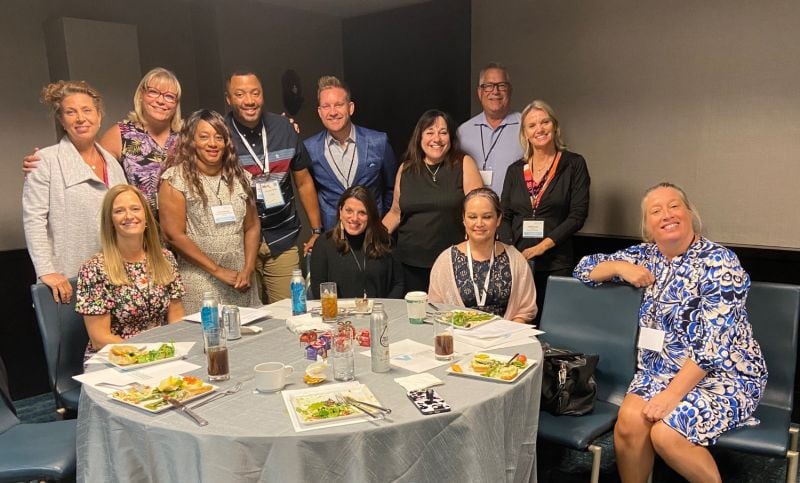
Onsite at VOLKSWAGEN Group of America, Inc.; Amy Quigley, Regional VP, Unbridled; Samantha Marie, Events Director / Business Development, OmniEra; and Lottie Elson, Head of Marketing Operations, IMEX
During a meeting preceding last month’s IMEX America, Prevue’s meeting planner advisers shared that while some challenges they faced a year ago had subsided, others still remain.
Unresponsive salespeople, inconsistent service, escalating hotel fees, airline delays and cancellations, a hostile political climate both domestically and internationally—the list of challenges faced by meeting planners in their daily jobs could fill this page. At a recent gathering of Prevue’s meeting planner advisers in mid-October, participants shared their biggest pain points.
In the ongoing seller’s market, hotels are making demands they have never made in the past, according to many in the group. “My clients are saying to me, ‘If I’m paying premium prices, I’m not getting premium service,’” said Lisa Palumbo, founder & chief event strategist, Tampa Bay Social. “I’m working with a company right now that is having to move their meeting date, and their first question is: ‘Why am I paying a food and beverage minimum now if I’m not having the meeting until 2025?'”
“Part of the struggle is that a lot of procurement people are not accepting the fact that prices have increased,” said Josh Adams, industry relations strategist, streamlinevents. “They’re still comparing things to the pre-pandemic prices. And you have to say, ‘Are you still paying the same amount for your groceries?’”
Sherrille Mingo, corporate meeting planner at VOLKSWAGEN Group of America, Inc., has had to deal with astronomical AV costs as a result of Encore’s domination of the industry. “I have a simple meeting coming up, and my AV fee for just an LCD projector and screen is $10,000. It doesn’t make any sense, especially when we have used the hotel multiple times and use Encore repeatedly. It should be $3,000-$3,500.”
“I think the problem is that revenue management now drives the decisions, versus the salespeople,” said Shontae Khaleel White, senior manager, global event operations, ACAMS. “We’ve lost our ability to rely on relationships to get a better deal because revenue management needs to make their 25% profit for this quarter.”
Nicky Baumohl, president & CEO, Evolutionary Events, also observed that hotels are not as responsive, or willing to hold space like they would in the past. “You can’t get answers back from them. I feel like the roles are reversed and now we have to hound the hotels to see if they got our RFP and to get a response. And by then, you’ve lost the space. Within 24 hours, it’s gone.”
The escalation of resort fees, in some cases as high as $45, had these meeting planners collectively up in arms—referring to them as “plus, plus, plus.” Even worse, said Samantha Marie, events director at OmniEra, hotels don’t make it clear what these fees cover. Items like parking, which was often included in the resort fee, are now excluded by many hotels using outside vendors. “Resort fees should cover things that you are going to use, like a coffee maker or internet, but now I don’t even know what they cover any more. If you’re going to charge for something, at least say what it covers.”
Though most agreed that basic service within hotels, such as room service and housekeeping, has improved in the past year, Amy Quigley, regional vice president, Unbridled, found the inconsistency to be the challenge. “People don’t know if their room is going to be serviced today, or if they need to call a number to get it serviced, or if the hotel has a standard where they service your room every two or three days.”
If hotels do not deliver on the service that’s expected, Adams believes they should be held accountable. “Your experience of going into a hotel includes any number of things: that that the spa is open, that your elevators are working, that you’re going to provide 24-hour room service. That’s part of why you choose a property. So, if you’re not receiving all those services, then you should get some compensation back.”
You Might Also Be Interested In…
Prevue’s Editorial Advisory Board
Meeting Costs Soar as Business Booms Back
Survey: Meetings Activity Hits Post-Pandemic High









